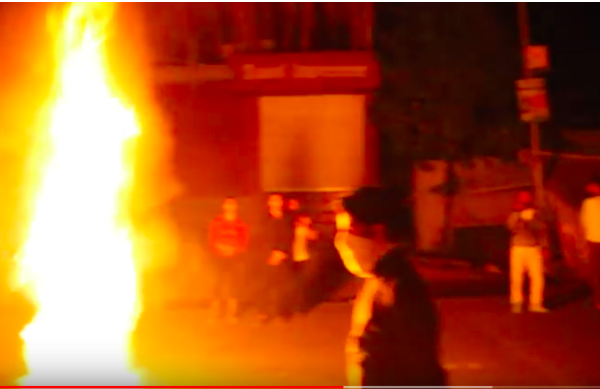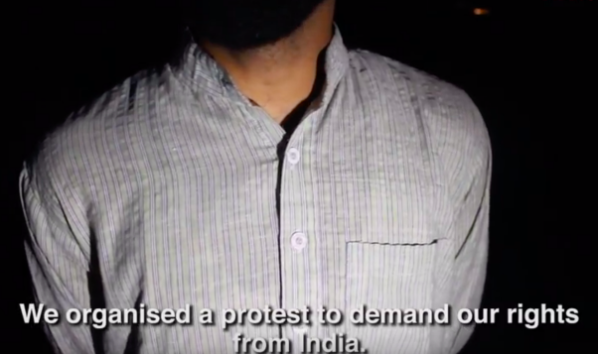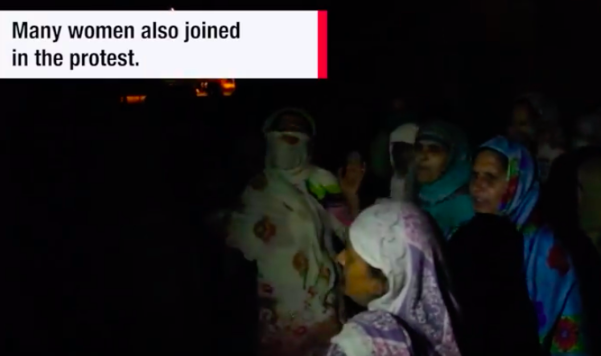Someone Needs to Tell Our Story, Say Kashmiris

It has been close to 60 days since the abrogation of Article 370 and the lockdown in the state of Jammu and Kashmir. The United Nations General Assembly and the address of Narendra Modi and Imran Khan was an important day for those in the Valley, one with massive diplomatic significance and hope. Reportedly, in the interiors of Srinagar, the locals huddled up together in front of the TV screens in the streets hoping to hear the world leaders finally acknowledge their voice.
Prior to the address, locals had told NewsClick that they were hoping for a statement by PM Modi. “It has been over 30 years that we are trying to get the world to listen to us, but that hasn’t happened, we are hoping that the UN will take note of the situation and our voices will be heard,” said a priest.
He added, “We are putting our faith in the international diplomatic efforts. We believe that this is a significant opportunity for our issues, for our struggle to find ground and some representation. The prime ministers of the two countries who speak of justice, democracy and development, now have the opportunity to come clean about their stand on Kashmir.”
Khurshid, a young boy from Aanchar told NewsClick, “We are putting shutters on our houses in the fear of a crackdown from the state. Our leaders are jailed under the Public Safety Act, so are the young boys from my village. Our power supplies are cut, it is becoming harder to access water and the healthcare system is crumbling. In this scenario, our only hope is international pressure and solidarity.”
However, to the disappointment of many locals, PM Modi completely skipped the mention of the situation in Kashmir and focused on the development agenda in India. The address of the Pakistani Prime minister Imran Khan, on the other hand, focused entirely on Kashmir. He spoke of the arrest of thousands of Kashmiris, the severed electronic access and the curfew imposed on the entire population of about 8 million. “Is it arrogance that has blinded him from seeing what is going to happen when the curfew is lifted? Does he think the people of Kashmir will quietly accept the status quo?” questioned Khan. “What is going to happen when the curfew is lifted will be a bloodbath,” he said.
The pent-up frustration of Kashmiris living under what the “Indian military occupation” would inevitably come back to haunt India, he said.
Following the address, several protests broke out in the state, in areas such as Ilahibagh, Maisuma, Baspora among others. Locals also reportedly burst crackers and chanted pro-Pakistan slogans. The locals stated that the reason for the protests was the “silence of Narendra Modi”.

Speaking to NewsClick, a 50-year-old businessman said, “Nobody is listening to us. The Indian media is not showing our side of the story. We are under a complete lockdown, we needed someone to tell our story to the world.
Speaking at a protest in the Valley, a young student said, “I had voted in the general elections held in May with a lot of hope, but now I feel like a traitor to the state for having voted. The Indian government betrayed our trust by revoking Article 370.”
Many locals also stated that with the detention of their leadership and the political vacuum in the state, “Imran Khan has become an ambassador for Kashmir”. A youth said, “We are out here protesting because we are energised. We are availing our right to free speech and protests showing solidarity with the speech because he has raised our issues and India, on the other hand, is colonising us and is invisibilising our struggle.”

India, on Saturday, exercised its right to reply to issue a rebuttal to Pakistan Prime Minister Imran Khan's speech at 74th Session of the United Nations General Assembly. In a strongly-worded reply, India said that Mr Khan's threat of unleashing nuclear devastation "qualifies as brinkmanship, not statesmanship". "Rarely has the General Assembly witnessed such misuse, rather abuse, of an opportunity to reflect. Words matter in diplomacy. Invocation of phrases such as 'pogrom', 'bloodbath', 'racial superiority', 'pick up the gun' and 'fight to the end' reflect a medieval mindset and not a 21st century vision," said Vidisha Maitra, first secretary, Ministry of External Affairs.
Diplomatically, not much is being said on the situation in Kashmir. Turkish President Recep Tayyip Erdogan had raised the Kashmir issue during his address at the United Nations, saying it is imperative to solve the problem through "dialogue on the basis of justice, equity, and not through collision". Malaysian Prime Minister Mahathir Mohamad has alleged that India has “invaded and occupied” Jammu and Kashmir and asked New Delhi to work with Pakistan to resolve the issue. The Malaysian prime minister, in his address to the UN General Assembly on Friday, said that there may be reasons for India’s action in Jammu and Kashmir “but it is still wrong”. He said despite UN resolutions, Jammu and Kashmir has been “invaded and occupied”.
The Valley extremely tense and volatile over the weekend. Many belonging to the working classes were fearing another Article 370 abrogation-like announcement, while many took off to their native places in fear of restrictions and an intensified crackdown in the state.
Also read: Kashmir: Women in Rainawari Accuse Local Police of Unleashing ‘Reign of Terror’
Get the latest reports & analysis with people's perspective on Protests, movements & deep analytical videos, discussions of the current affairs in your Telegram app. Subscribe to NewsClick's Telegram channel & get Real-Time updates on stories, as they get published on our website.
























